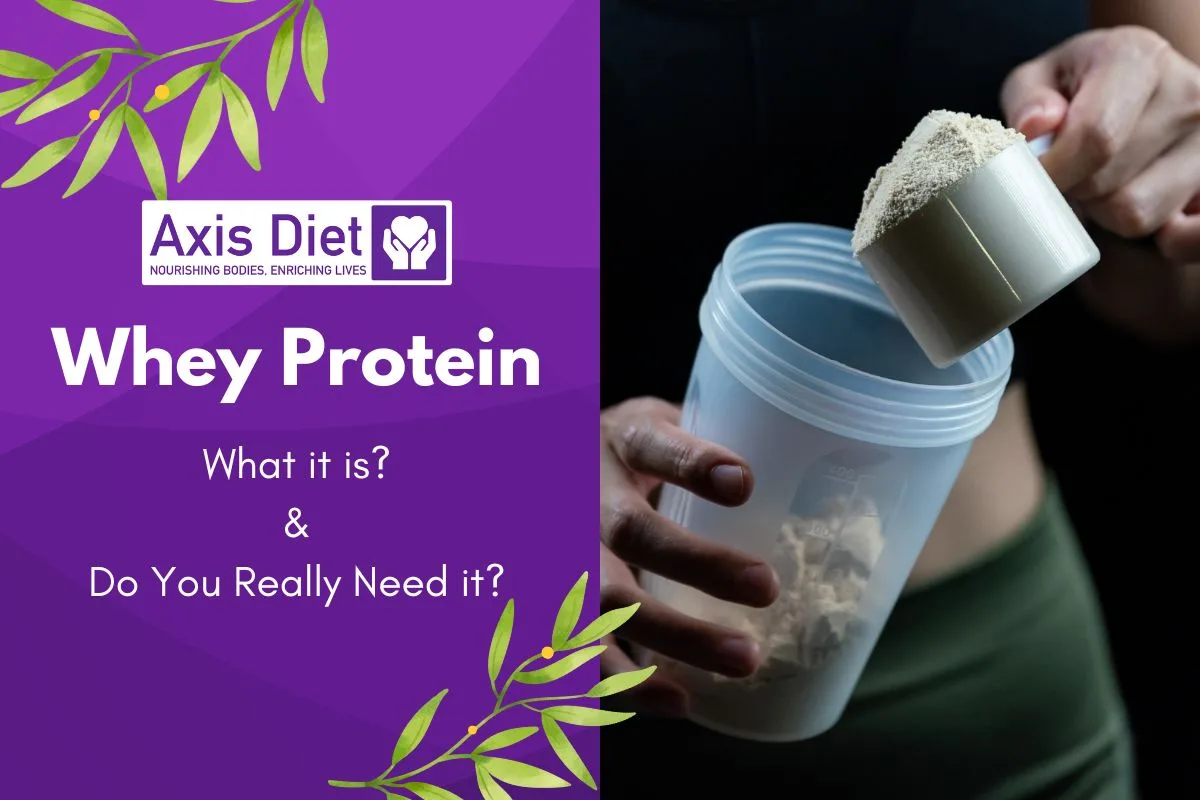
Whey Protein: What It Is and Do You Really Need It?
In the vast world of fitness and nutrition, whey protein has emerged as a cornerstone supplement, celebrated for its muscle-building prowess and health benefits. But what exactly is whey protein, and more importantly, do you really need it?
As you navigate through the aisles of health stores or scroll through endless online products, it’s essential to cut through the hype and understand the science behind whey protein.
What is Whey & Whey Protein?
Whey protein is one of the two primary proteins found in milk, the other being casein. When milk is processed to form cheese or yogurt, the remaining liquid is called whey. Before processing, about 20% of the protein in milk is whey and the other 80% is made up of the slower-digesting casein proteins.

Whey protein is then extracted from this liquid and processed into a powder form, which is what we recognize as whey protein supplement.
Whey protein is available in several forms, distinguished by their processing methods and composition:
- Whey Protein Concentrate (WPC): This form retains more of the natural nutrients found in whey, containing 70-80% protein by weight along with some lactose and fats. It’s appreciated for its flavor and nutritional profile.
- Whey Protein Isolate (WPI): Isolate is further refined to reduce lactose and fat, resulting in a product that’s over 90% protein. This makes WPI an excellent option for those with lactose sensitivity or who are seeking a lower-calorie protein source.
- Whey Protein Hydrolysate (WPH): Hydrolysate has undergone partial hydrolysis, a process that pre-digests the protein, making it the quickest to absorb. This form is particularly beneficial for immediate post-workout recovery, as it rapidly delivers amino acids to muscles.
However, the types of amino acids found in all forms of whey are virtually identical, since they are derived from the same proteins.
How Whey Protein Works: Supporting Muscle Growth and Repair
Whey protein plays a crucial role in the fitness and nutrition landscape, primarily due to its profound impact on muscle growth, repair, and the strategic timing of its consumption for optimal benefits.
Understanding these aspects can significantly enhance one’s fitness results, whether the goal is to build muscle, enhance recovery, or both.
Enhancing Muscle Protein Synthesis
The foundation of muscle growth lies in the process of muscle protein synthesis, where the body repairs and builds muscle fibers. Whey protein, renowned for its rich leucine content—a critical branched-chain amino acid—significantly boosts this process.
Leucine acts as a key trigger for Muscle Protein Synthesis, and whey’s ability to rapidly deliver these essential nutrients to muscle cells post-exercise makes it superior for fostering muscle growth.
Research underscores whey protein’s efficacy, showing it outperforms other protein sources in stimulating muscle protein synthesis, thus offering an edge for those dedicated to maximizing their muscle development.
Accelerating Muscle Repair
Physical activity, especially strenuous exercise, imposes stress on muscle fibers, causing microtears that necessitate repair. This repair process is not only essential for muscle recovery but also for the growth and strengthening of muscle tissue.
Whey protein, with its comprehensive amino acid profile, provides the necessary building blocks for this repair, mitigating muscle soreness and shortening recovery periods. This accelerated repair process is beneficial as it allows for more frequent and intense workouts, thereby enhancing overall athletic performance and muscle gains over time.
Incorporating Whey Protein into a Balanced Diet
Incorporating whey protein into a balanced diet goes beyond just picking the right supplement; it involves integrating it seamlessly with your overall nutritional goals and lifestyle.
Here’s a more detailed look at how to do this effectively, focusing on the importance of a varied diet, understanding your protein needs, and optimizing the timing of whey protein consumption.
Balancing Your Diet
Whey protein is most effective when it’s part of a diet that supports your fitness and health goals. A balanced diet includes a mix of carbohydrates, fats, and proteins from various sources to ensure you’re getting a wide range of nutrients. While whey protein is a high-quality source of protein, relying on it solely can mean missing out on other essential nutrients found in whole foods like fruits, vegetables, grains, and other protein sources like meats, fish, and legumes.
Calculating Your Protein Needs
Your protein needs depend on your body weight, activity level, and fitness goals. A general guideline for active individuals is to consume around 0.8-1.0 grams of protein per kilogram of body weight daily. For muscle building or during periods of intense training, this requirement can increase to 1.2 to 2.0 grams per kilogram. Calculating your needs can help you understand how much whey protein to incorporate into your diet, alongside other protein sources, to meet your daily goals.
Optimizing Timing for Whey Protein Consumption
While the concept of the “anabolic window” has evolved, understanding when to consume protein can still play a role in maximizing its benefits:
- Morning: Starting your day with whey protein can stimulate muscle protein synthesis, helping to offset muscle breakdown that may have occurred overnight.
- Post-Workout: While the anabolic window might be larger than once thought, consuming whey protein after exercise can still support muscle repair and growth. The exact timing may not be as critical, but aiming for a protein intake within a couple of hours post-workout can contribute to recovery and muscle building.
- Throughout the Day: Using whey protein as a snack or part of meals throughout the day can ensure a steady supply of amino acids to your muscles, supporting ongoing repair and growth.
- Before Bed: There’s emerging evidence that a protein intake before sleep can aid in muscle recovery and growth overnight, though more research is needed to fully understand its impact.
Personalizing Your Approach
Ultimately, the best timing for protein consumption varies by individual. Factors such as the intensity of your workouts, your overall diet, and personal preferences should guide your choices.
For some, a whey protein shake after a workout fits well with their routine, while others might prefer it as a morning boost or a nighttime snack. Given the wide range of commercial whey protein products available, it’s important to choose one that fits your health and dietary needs.
To ensure you’re safely incorporating protein into your diet, especially if you have specific health conditions or dietary restrictions, consider consulting a registered dietitian. A dietitian can provide personalized advice, helping you select the right type of whey protein and determining the optimal timing and amount for consumption based on your individual health profile and fitness goals.
Conclusion
Whey protein is a versatile and effective supplement for those looking to support muscle growth, enhance recovery, and achieve their fitness goals. Understanding its benefits, the different forms available, and how to incorporate it into your diet can empower you to make informed choices about your nutritional strategies. As always, consider your unique dietary needs and consult with healthcare professionals to tailor your protein intake to your personal health and fitness objectives.
Incorporating whey protein into your regimen is more than just about boosting muscle; it’s about supporting your body’s overall recovery and performance capabilities, ensuring you’re ready to tackle your next workout with strength and vigor.
Axis Diet is dedicated to empowering individuals with knowledge and practical advice for healthier living. Our articles, grounded in research and expert insights, aim to simplify complex nutritional concepts, offering a comprehensive understanding of various aspects of diet and wellness. While these articles are informative and a great starting point for anyone looking to improve their health, they are for informational purposes only.
For personalized, professional guidance tailored to your unique health needs, we encourage you to consult with Axis Diet’s registered dietitians. Reach out to us at https://www.axisdiet.com/contact/ for expert personalized guidance on your nutritional journey.


